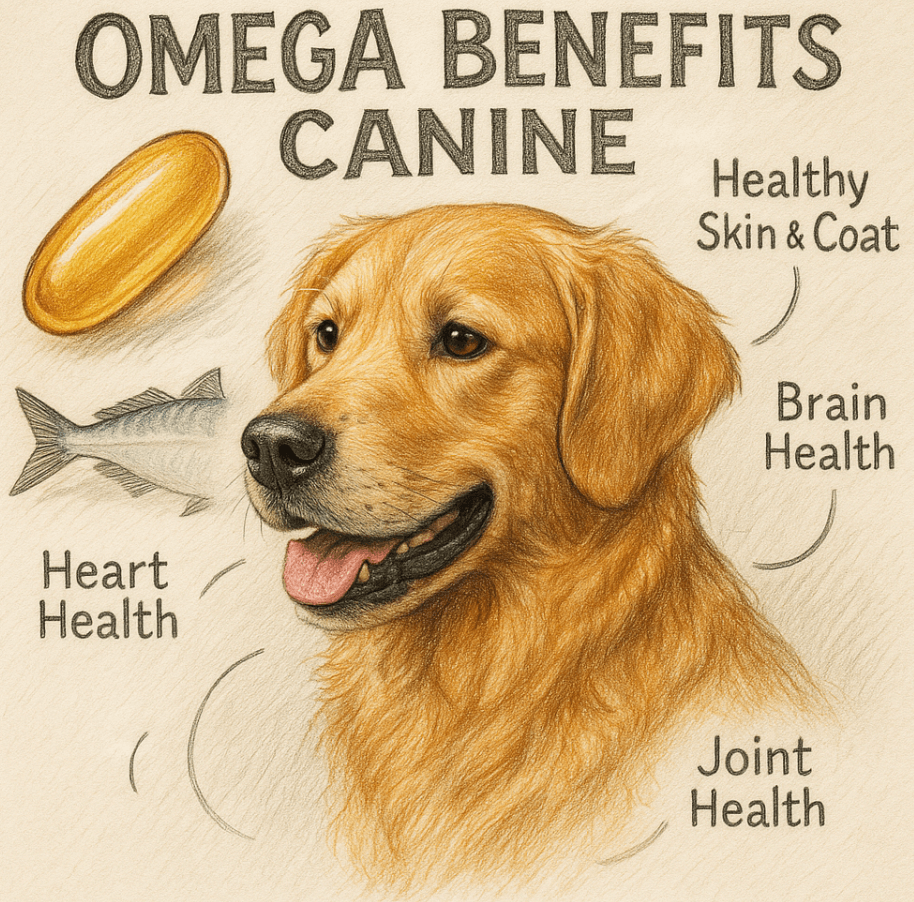Omega Benefits Canine: Unlocking the Power of Omega Fatty Acids for Your Dog’s Health
When it comes to supporting your dog’s overall health, omega fatty acids are a game-changer. These essential nutrients, often found in fish oil, flaxseed, and other natural sources, play a vital role in maintaining your canine companion’s well-being. From promoting a shiny coat to supporting joint health and cognitive function, omega benefits canine health in countless ways. But what exactly are these benefits, and how can you ensure your dog is getting enough?
In this blog post, we’ll explore the science behind omega fatty acids, their incredible advantages, and practical tips for incorporating them into your dog’s diet. Whether you’re a seasoned pet parent or new to the world of canine nutrition, this guide will help you make informed decisions for your furry friend’s long-term health.
Key Omega Benefits Canine Owners Should Know
Omega fatty acids, particularly omega-3 and omega-6, are essential for dogs as they cannot produce these nutrients on their own. Here are some of the most significant omega benefits canine owners should be aware of.
Promotes a Healthy Coat and Skin:
Omega-3 fatty acids reduce inflammation and dryness, leading to a shinier coat and healthier skin free from irritation.Supports Joint Health:
Omega-3s have anti-inflammatory properties that help alleviate symptoms of arthritis and improve mobility in older dogs.Boosts Immune Function:
A balanced intake of omega fatty acids strengthens the immune system, helping your dog fight off infections and illnesses.Enhances Cognitive Function:
DHA, a type of omega-3, supports brain development in puppies and slows cognitive decline in senior dogs.Improves Heart Health:
Omega-3s reduce triglyceride levels and support cardiovascular function, lowering the risk of heart disease.
These omega benefits canine health in profound ways, making them a crucial component of a balanced diet for dogs of all ages and breeds.
Best Sources of Omega Fatty Acids for Dogs
Incorporating omega-rich foods into your dog’s diet is easier than you might think. Here are some of the best sources of omega fatty acids that provide maximum benefits.
Fish Oil:
Rich in EPA and DHA, fish oil is one of the most effective sources of omega-3 fatty acids for dogs.Salmon and Sardines:
These oily fish are packed with omega-3s and can be served cooked (without seasoning) as an occasional treat.Flaxseed:
A plant-based option, flaxseed provides omega-3s and can be sprinkled on your dog’s food in moderation.Chia Seeds:
Another plant-based source, chia seeds are rich in omega-3s and can be added to meals for a nutritional boost.Krill Oil:
This sustainable alternative to fish oil is highly bioavailable, meaning your dog’s body can absorb it more efficiently.
By including these nutrient-dense foods in your dog’s diet, you can ensure they reap the full omega benefits canine health requires.
Check this guide 👉Dog Food with Omega 3 and 6: Best 7 Expert Tips!
Check this guide 👉Top 5 Best Dog Food Toppers for Ultimate Nutrition Boost!

Benefits of Omega-3 Fatty Acids | Benefits of Omega-6 Fatty Acids |
|---|---|
Reduces inflammation in joints | Supports healthy skin and coat |
Improves brain function | Regulates metabolism |
Strengthens the immune system | Aids in hormone production |
Promotes cardiovascular health | Helps maintain cell membrane health |
Slows cognitive aging | Encourages wound healing |
How to Incorporate Omega Fatty Acids into Your Dog’s Diet
Adding omega fatty acids to your dog’s diet doesn’t have to be complicated. With a few simple steps, you can ensure they receive the omega benefits canine health depends on.
Choose High-Quality Supplements:
Look for vet-recommended omega supplements specifically formulated for dogs, ensuring proper dosage and safety.Mix with Regular Food:
Add liquid fish oil or powdered supplements to your dog’s meals for an easy nutritional boost.Rotate Protein Sources:
Include omega-rich proteins like salmon or sardines in rotation with their regular diet for variety.Monitor for Allergies:
Introduce new foods gradually and watch for signs of allergies, such as itching or digestive upset.Consult Your Veterinarian:
Always seek professional advice before making significant changes to your dog’s diet, especially for senior or health-compromised pets.
With careful planning, you can seamlessly integrate omega fatty acids into your dog’s daily routine.
Signs Your Dog May Need More Omega Fatty Acids
If your dog isn’t receiving enough omega fatty acids, certain signs may indicate a deficiency. Recognizing these symptoms can help you address potential issues early.
Dry, Flaky Skin:
Lack of omega-3s often leads to dry, irritated skin and excessive scratching.Dull Coat:
A lackluster coat lacking shine is a common sign of insufficient omega fatty acids.Joint Stiffness:
Difficulty moving or stiffness, especially in older dogs, may signal a need for more omega-3s.Frequent Ear Infections:
Chronic ear infections can be linked to an imbalance of omega fatty acids affecting skin health.Behavioral Changes:
Cognitive decline or irritability in senior dogs may indicate a need for DHA-rich omega-3s.
Addressing these signs promptly ensures your dog stays healthy and vibrant.
Common Misconceptions About Omega Fatty Acids for Dogs
Despite their popularity, several misconceptions surround omega fatty acids and their role in canine health. Clearing up these myths helps pet owners make better choices.
All Oils Are Created Equal:
Not all oils contain the same types of omega fatty acids; fish oil is superior to vegetable oils for dogs.More Is Always Better:
Over-supplementation can harm your dog’s health, so stick to recommended dosages.Only Senior Dogs Need Omegas:
Dogs of all ages benefit from omega fatty acids, not just older ones.Plant-Based Omegas Are Enough:
While helpful, plant-based omegas like flaxseed don’t provide DHA as effectively as marine sources.Omegas Cure All Health Issues:
While beneficial, omegas are part of a holistic approach to health and shouldn’t replace veterinary care.
Understanding these truths ensures you use omega fatty acids effectively and safely.
Tips for Choosing the Right Omega Supplement
With so many options available, selecting the best omega supplement for your dog can feel overwhelming. These tips will guide you toward the right choice.
Look for Third-Party Testing:
Ensure the product has been tested for purity and potency by an independent lab.Check for EPA and DHA Content:
Focus on supplements listing specific amounts of these active omega-3 components.Avoid Artificial Additives:
Steer clear of products with unnecessary fillers, preservatives, or flavorings.Consider Sustainability:
Opt for eco-friendly options like krill oil or sustainably sourced fish oil.Read Customer Reviews:
Feedback from other pet owners can provide valuable insights into product effectiveness.
Choosing wisely ensures your dog receives high-quality omega benefits canine health demands.
Omega Fatty Acids and Breed-Specific Needs
Different breeds have unique health challenges, and omega fatty acids can address many of these concerns. Here’s how omega benefits canine health across various breeds.
Large Breeds (e.g., German Shepherds):
Omega-3s reduce joint inflammation, combating hip dysplasia common in large breeds.Small Breeds (e.g., Chihuahuas):
Omegas support dental health and prevent plaque buildup in toy breeds.Working Dogs (e.g., Border Collies):
Omega-3s aid endurance and recovery after intense physical activity.Senior Breeds (e.g., Bulldogs):
DHA-rich omegas slow cognitive decline and improve mobility in aging dogs.Brachycephalic Breeds (e.g., Pugs):
Anti-inflammatory properties help manage respiratory issues in flat-faced breeds.
Tailoring omega intake to your dog’s breed ensures targeted support for their unique needs.
Frequently Asked Questions About Omega Benefits Canine Health
Can I give my dog human omega supplements?
No, human supplements may contain ingredients unsafe for dogs. Always choose pet-specific products.
How much omega-3 should my dog get daily?
Dosage varies by size and breed; consult your vet for personalized recommendations.
Are there risks of over-supplementing omega fatty acids?
Yes, excessive amounts can lead to diarrhea, weight gain, or imbalances in nutrient absorption.
Can puppies benefit from omega fatty acids?
Absolutely! Omega-3s support brain development and overall growth in young dogs.
What’s the difference between omega-3 and omega-6?
Omega-3 reduces inflammation, while omega-6 supports skin health and cell function—both are essential in balance.
Prioritizing Omega Benefits for Your Canine Companion
Omega fatty acids are a cornerstone of canine nutrition, offering a wide range of health benefits that enhance your dog’s quality of life. From improving their coat and joint health to boosting immunity and cognitive function, the omega benefits canine health relies on are undeniable. By understanding the importance of these essential nutrients and incorporating them into your dog’s diet responsibly, you can ensure they live a longer, healthier, and happier life. Remember, every dog is unique, so always tailor their nutrition to their specific needs and consult your veterinarian for guidance. With the right approach, you can unlock the full potential of omega benefits for your beloved furry friend.
Omega Benefits Canine: Best 7 Expert Tips! Discover how omega fatty acids boost your dog’s health, from skin and coat to joints and immunity, with expert advice for optimal canine wellness.
Service Dog for Depression: Best 7 Expert Tips! Discover how service dogs provide emotional support, perform vital tasks, and improve mental health for individuals managing depression.
Is a Great Pyrenees a Family Dog? Best 7 Expert Tips! Discover expert advice on temperament, care, and training to determine if this gentle giant is the perfect family companion for your home.
Munsterlander Dog: Best 7 Expert Tips! Discover expert advice on training, care, and living with this intelligent, energetic breed for a happy and healthy companion.



